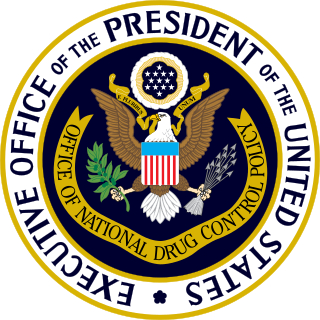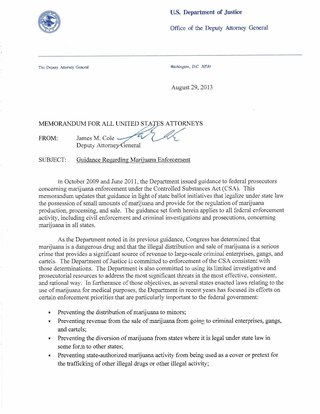Related Research Articles

The Office of National Drug Control Policy (ONDCP) is a component of the Executive Office of the President of the United States.
Drug czar is an informal name for the person who directs drug-control policies in various areas. The term follows the informal use of the term czar in U.S. politics. The 'drug czar' title first appeared in a 1982 news story by United Press International that reported that, "[United States] Senators ... voted 62–34 to establish a 'drug czar' who would have overall responsibility for U.S. drug policy." Since then, several ad hoc executive positions established in both the United States and United Kingdom have subsequently been referred to in this manner.

John P. Walters is the president and chief executive officer of Hudson Institute; he was appointed in January 2021. He joined Hudson in 2009 as the executive vice president and most recently was the chief operating officer. Previously, Walters was Director of the White House Office of National Drug Control Policy (ONDCP) in the George W. Bush administration. He held that position from February 5, 2001, to January 20, 2009. As the U.S. "Drug Czar", Walters coordinated all aspects of federal anti-drug policies and spending. As drug czar, he was a staunch opponent of drug decriminalization, legalization, and medical marijuana.

The war on drugs is the policy of a global campaign, led by the United States federal government, of drug prohibition, foreign assistance, and military intervention, with the aim of reducing the illegal drug trade in the US. The initiative includes a set of drug policies that are intended to discourage the production, distribution, and consumption of psychoactive drugs that the participating governments, through United Nations treaties, have made illegal.

In the United States, the removal of cannabis from Schedule I of the Controlled Substances Act, the category reserved for drugs that have "no currently accepted medical use", is a proposed legal and administrative change in cannabis-related law at the federal level. After being proposed repeatedly since 1972, the U.S. Department of Justice initiated 2024 rulemaking to reschedule cannabis to Schedule III of the Controlled Substances Act. The majority of 2024 public comments supported descheduling, decriminalizing, or legalizing marijuana at the federal level.

In the United States, the non-medical use of cannabis is legalized in 24 states and decriminalized in 7 states, as of November 2023. Decriminalization refers to a policy of reduced penalties for cannabis offenses, typically involving a civil penalty for possessing small amounts, instead of criminal prosecution or the threat of arrest. In jurisdictions without penalty the policy is referred to as legalization, although the term decriminalization is sometimes used for this purpose as well.

In the United States, increased restrictions and labeling of cannabis as a poison began in many states from 1906 onward, and outright prohibitions began in the 1920s. By the mid-1930s cannabis was regulated as a drug in every state, including 35 states that adopted the Uniform State Narcotic Drug Act. The first national regulation was the Marihuana Tax Act of 1937.

The use, sale, and possession of cannabis containing over 0.3% THC by dry weight in the United States, despite laws in many states permitting it under various circumstances, is illegal under federal law. As a Schedule I drug under the federal Controlled Substances Act (CSA) of 1970, cannabis containing over 0.3% THC by dry weight is considered to have "no accepted medical use" and a high potential for abuse and physical or psychological dependence. Cannabis use is illegal for any reason, with the exception of FDA-approved research programs. However, individual states have enacted legislation permitting exemptions for various uses, including medical, industrial, and recreational use.

In the United States, the use of cannabis for medical purposes is legal in 38 states, four out of five permanently inhabited U.S. territories, and the District of Columbia, as of March 2023. Ten other states have more restrictive laws limiting THC content, for the purpose of allowing access to products that are rich in cannabidiol (CBD), a non-psychoactive component of cannabis. There is significant variation in medical cannabis laws from state to state, including how it is produced and distributed, how it can be consumed, and what medical conditions it can be used for.

Cannabis in California has been legal for medical use since 1996, and for recreational use since late 2016. The state of California has been at the forefront of efforts to liberalize cannabis laws in the United States, beginning in 1972 with the nation's first ballot initiative attempting to legalize cannabis. Although it was unsuccessful, California would later become the first state to legalize medical cannabis through the Compassionate Use Act of 1996, which passed with 56% voter approval. In November 2016, California voters approved the Adult Use of Marijuana Act with 57% of the vote, which legalized the recreational use of cannabis.

Kevin Abraham Sabet is a former three-time White House Office of National Drug Control Policy advisor, having been the only person appointed to that office by both a Republican and Democrat. He is also an assistant professor adjunct at Yale University Medical School, a fellow at Yale's Institution for Social and Policy Studies, and a columnist at Newsweek.

Washington Initiative 502 (I-502) "on marijuana reform" was an initiative to the Washington State Legislature, which appeared on the November 2012 general ballot, passing by a margin of approximately 56 to 44 percent. Originally submitted to the Washington Secretary of State during the summer of 2011, enough signatures were collected and submitted by December to meet the required 241,153 signatures, sending it to the legislature. When the legislature adjourned without action in April, Initiative 502 automatically advanced to the November 2012 general ballot. It was approved by popular vote on November 6, and took effect over the course of a year, beginning with certification no later than December 6, 2012. Along with a similar Colorado measure, Initiative 502 was credited for encouraging voter turnout of 81%, the highest in the nation.

Cannabis in Washington relates to a number of legislative, legal, and cultural events surrounding the use of cannabis. On December 6, 2012, Washington became the first U.S. state to legalize recreational use of marijuana and the first to allow recreational marijuana sales, alongside Colorado. The state had previously legalized medical marijuana in 1998. Under state law, cannabis is legal for medical purposes and for any purpose by adults over 21.

The Cannabis Act (C-45) of June, 2018 paved the way for the legalization of cannabis in Canada on 17 October 2018. Police and prosecution services in all Canadian jurisdictions are currently capable of pursuing criminal charges for cannabis marketing without a licence issued by Health Canada. The Supreme Court of Canada has held that the federal Parliament has the power to criminalize the possession of cannabis and that doing so does not infringe upon the Canadian Charter of Rights and Freedoms. The Ontario Court of Appeal and the Superior Court of Ontario have, however, held that the absence of a statutory provision for medical marijuana is unconstitutional, and to that extent the federal law is of no force and/or effect if a prescription is obtained. The recreational use of cannabis has been legalized by the federal government, and took effect on 17 October 2018.
The first Donald Trump administration (2017–2021) took positions against marijuana and against the easing of laws regarding marijuana. Although Trump indicated during his 2016 presidential campaign that he favored leaving the issue of legalization of marijuana to the states, his administration subsequently upheld the federal prohibition of cannabis, and Trump's 2021 fiscal budget proposal included removing protections for state medical marijuana laws.

The Cole Memorandum was a United States Department of Justice memorandum issued August 29, 2013, by United States Deputy Attorney General James M. Cole during the presidency of Barack Obama. The memorandum, sent to all United States Attorneys, governed federal prosecution of offenses related to marijuana. The memo stated that given its limited resources, the Justice Department would not enforce federal marijuana prohibition in states that "enacted laws legalizing marijuana in some form and ... implemented strong and effective regulatory and enforcement systems to control the cultivation, distribution, sale, and possession of marijuana," except where a lack of federal enforcement would undermine federal priorities.
The cannabis policy of the Reagan administration involved affirmation of the War on Drugs, government funded anti-cannabis media campaigns, expanded funding for law enforcement, involvement of the U.S. military in interdiction and eradication, reduction in emphasis in drug treatment, and creation of new Federal powers to test employees and seize cannabis-related assets.
The Cannabis Regulation and Tax Act is an act legalizing and regulating the production, consumption, and sale of cannabis in Illinois. It was approved by both houses by May 31, 2019 and came into effect January 1, 2020.

The Marijuana Opportunity Reinvestment and Expungement Act, also known as the MORE Act, is a proposed piece of U.S. federal legislation that would deschedule cannabis from the Controlled Substances Act and enact various criminal and social justice reforms related to cannabis, including the expungement of prior convictions.
U.S. President Joe Biden stated in February 2021 that his administration will pursue cannabis decriminalization as well as seek expungements for people with prior cannabis convictions. As of October 2022, Biden pardoned thousands of people convicted of marijuana possession under federal law. However, according to the Marshall Project, nobody was released from prison as a result of the October 2022 pardons, as no federal inmates were incarcerated for simple marijuana use at the time.
References
- ↑ Andrew Blake (August 29, 2018), "Trump administration quietly fighting against marijuana support, legalization: Report", The Washington Times
- ↑ Josh Jardine (September 26, 2018), "The Government's Secret Anti-Cannabis Agency Can't Be Real... Can It?", The Stranger , Seattle
- ↑ Harry Cheadle (August 29, 2018), "The Trump Administration Has Secretly Launched an Anti-Weed Committee – but no one outside the administration seems to know what it's doing.", Vice
- ↑ Holden, Dominic (August 29, 2018), Inside The Trump Administration's Secret War On Weed, BuzzFeed News
- ↑ Christopher Ingraham (August 30, 2018), "The White House is looking for 'negative trends' on marijuana. We've got them.", Wonkblog , The Washington Post
- ↑ Megan Keller (August 29, 2018), "Trump tasked multi-agency committee with countering pro-marijuana message: report", The Hill
- ↑ A.J. Herrington (August 29, 2018), "Trump Regime Reportedly Attempting to Undermine Legal Pot Reefer Madness-Style", High Times
- ↑ Report: White House Working To Portray Marijuana In Negative Light, Denver: KCNC-TV, August 31, 2018
- ↑ Anti-Pot Staffers Conspire to Turn Trump Against Marijuana Federalism, MassCentral.com, September 2, 2018[ permanent dead link ]